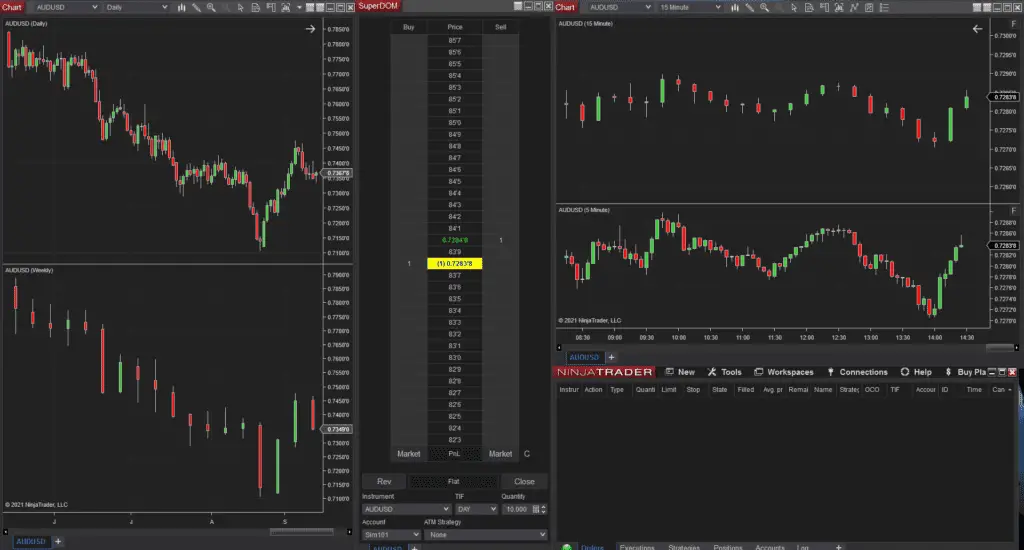In this post I’ll outline how to use Ninjatrader charts, templates and workspaces. This is a concise resource for anyone wanting to understand how to open and create a chart. also, how to create a template or workspace.
I’ve also put together a video for those that prefer that format.
How do you open a chart in NinjaTrader?
Before we get started, make sure that you have a data connection and that it’s enabled under ‘Connections’ on your Control Center. If you haven’t done this yet, visit my previous post ‘How to use NinjaTrader 8‘.
To open a chart in NinjaTrader can be done through the Control Center.

Step 1: Click New on the top menu toolbar. A drop-down will appear
Step 2: Select Chart See white box below

The Data Series window will appear.
Step 3: Select your instrument
There are two ways to do this:
- Drop down: Click the down arrow to reveal a drop-down list of your most recently viewed.
Tip: The instrument appearing at the top, above the fainted line, is the most recent instrument viewed instrument (see yellow box below). The one appearing below are the default instrument list* (see blue box below)
*An instrument list is a pre-set list of instruments that follow a specific theme or preference.
To learn more about this, click here to view my quick tutorial on how to create your own Ninjatrader instrument list.

- Input: Select the instrument field then type the ticker or forex pair using your keyboard

Once you have selected the instrument, the Properties panel will appear on the right.

Step 4: Setup chart properties
The screenshot above shows the default settings of the properties. For example, by default, the data series is set to 1 minute.
Here are some of the chart properties you should consider setting up:
- Data Series
- Price based on: Ask/Bid/Last
- Type*: minute/day/month/Ticks/Heiken Ashi/Kagi
- Value: numerical value of the data type
- Time frame
- Load data based on: bars/days
- End date: format (mm/dd/yyyy)
- Chart Style
- Chart style: Candlestick/OHLC/Point and Figure
- Plot executions: How your trade executions be displayed on the chart
- Text and marker/Marker only/Do not plot
Step 5 [Optional]: If you would like to add another instrument, click on the instrument field again then select the instrument. This will add the active instrument list on the left panel. See white box below

Step 6: Once you have all your instruments and properties set up, click OK.
Chart window(s) will then pop out, and data for the instrument will populate the chart.
Can you save a chart in NinjaTrader 8?
Chart properties and indicator settings can be saved as a chart template on NinjaTrader. Templates are saved user settings, customizations, and preferences that can be later loaded to a new chart.
To learn how to save chart templates, visit ‘How do you save a template in NinjaTrader 8’? section below.
Does NinjaTrader have tick charts?
Yes, tick-based charts are an available data series type for NinjaTrader charts.
This type of chart will be based on transactions / trades instead of a time interval. A tick bar represents a specific number of trades. The number of ticks per bar can also be set by the user.
See below on how to use tick charts:
Steps in creating tick charts
From the Data Series window (see section above How do you open a chart in NinjaTrader):
Step 1: On the instrument properties* panel, under Data Series, click Type
Step 2: Select Tick See white box below

Step 3: Set Value
Value represents the number of ticks/transactions per tick bar.

Step 4: Click OK
What are NinjaTrader Templates and Workspaces?
Templates and workspaces are really helpful features available on all NinjaTrader plans. Templates and workspaces and great for organizing your workspace and make saving your preferred setups easy to retrieve every time you open a chart or log in.
What is a NinjaTrader Workspace?
Workspaces are customized platform layouts. It is a collection of windows that includes chart window customization, properties setups and settings.
What is a NinjaTrader Template?
Templates are customized chart layouts and settings. A template can include configured indicators, data series, strategies, chart properties, among other chart-related elements.
What is the difference between Templates and Workspaces?
The main difference between Templates and Workspaces is that templates are focused on chart-related configurations and setup, while workspaces are focused on your workflow setup and the arrangement of NinjaTrader windows which include chart templated windows.
What is the benefit of using Templates and Workspaces?
Templates and workspaces are excellent time saver features that promote user convenience.
You would no longer need to start from scratch with blank workspaces and charts. Instead login and retrieve a saved template or workspace with all your preferred settings
How do you save a template in NinjaTrader 8?
Once you have a customized chart, you can save this chart as a template to apply to your next new chart or a currently open chart.
Once you have set up your chart, follow the steps below in saving a template on NinjaTrader 8:
Step 1: Make sure you have applied your preferences on an existing chart
Step 2: Right click on any area of the chart. A drop-down menu will appear. See white box below
Step 3: Hover on Templates See yellow box below
Step 4: Click Save As See blue box above. The Save As window will appear
Step 5: Name your template > Click Save

In the example above, the Ninjatrader save chart template will be named ‘Parabolic SAR Benchmark vs Stock (Weekly, 365 days)
This template is stored and ready to be loaded on your next chart.
How do you create a workspace in NinjaTrader 8?
By default, each user will begin with a blank workspace.
Tip: Saved workspaces will also save your chart preferences (e.g., applied templates, instruments)
Steps in creating a workspace in NinjaTrader 8
Step 1: From the Control Center, Click Workspaces
You will see all saved workspaces here

Step 2: Click New. New Workspace window will appear
Step 3: Enter name of your new workspace > Click Ok

Step 4: Create and arrange your preferred workspace
Add any preferred features such as SuperDOM, multiple charts, order entries, etc.

Once you have added and arranged your preferred tools and features, the new workspace should be saved.
How do you save a workspace in NinjaTrader 8?
To save a workspace in Ninjatrader 8, follow these steps:
Step 1: Visit the Control Center > Click Workspaces
Step 2: Hover on the name of the workspace you previously created
In the example above, I named my workspace as “Multiple chart timeframes with SuperDOM”

Step 3: Click Save or Save as (if you haven’t already given it a name or want to save it as something else)
You have now created and saved your custom workspace. Continue to the next section to learn how to load your new Ninjatrader workspace.
How do you load a workspace in NinjaTrader 8?
NinjaTrader 8 allows you to load multiple custom workspaces where you can shift from one workspace to another fast and easily.
Follow these quick easy steps and tips to load custom workspaces:
Step 1: From the Control Center, click Workspaces. You will see all your saved workspaces.
Step 2: Click the workspace that you would like to activate or to load

Tip 1: Interpreting the status symbols See white circle above
- Green: Active workspace that is currently showing up on your screen
- Gray: Opened workspace that is running on the background
Your active workspace should load on your screen – arranged with your saved preference.
Tip 2: Shifting from one workspace to another*
- Click Workspaces from Control Center
- Select a workspace with gray circle
- Shift + F3 [shortcut]
- Quickly shifts to the workspaces marked with gray circle
*Note – you can only shift between opened (gray)/active (green) workspaces



